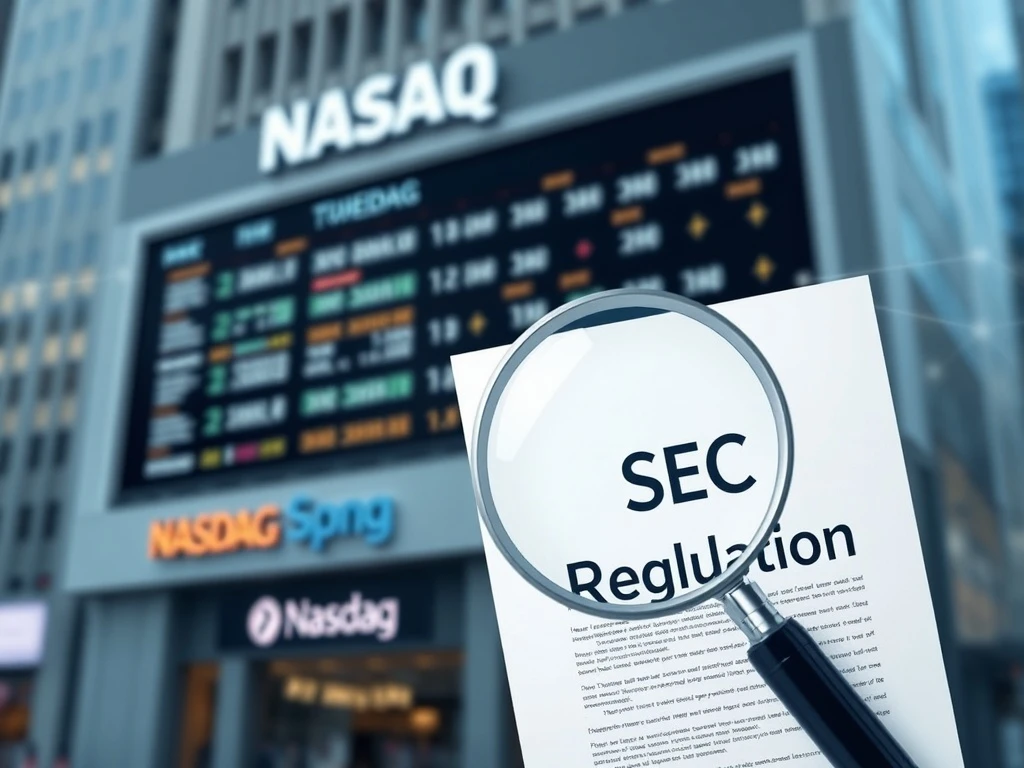Tokenized Securities Face Crucial Delay as Ondo Finance Challenges Nasdaq’s Plan

The future of Tokenized Securities on major exchanges faces a critical juncture. Ondo Finance, a prominent blockchain firm, has formally urged the U.S. Securities and Exchange Commission (SEC) to halt or reject Nasdaq’s ambitious proposal. This move casts a significant shadow over Nasdaq Tokenization efforts. Ondo argues that Nasdaq’s plan lacks essential transparency, potentially creating an unfair advantage for established market participants. This challenge highlights growing concerns within the digital asset space regarding regulatory oversight and fair market access.
Ondo Finance Raises Key Transparency Concerns
In a detailed letter sent to the US regulator, Ondo Finance articulated its core objections. The company, known for issuing tokenized versions of traditional assets, stated that regulators and investors cannot properly assess Nasdaq’s proposal. This is because it lacks public details on how the Depository Trust Company (DTC) will manage blockchain settlements. The DTC acts as the primary depository for US securities. It also facilitates their post-trade settlement. Without these crucial details, the evaluation process remains incomplete.
Ondo acknowledged its support for Nasdaq’s move towards tokenization. However, it strongly warned against the current approach. “Nasdaq’s reference to non-public information implies differential access,” Ondo’s letter explained. This access, they argued, “deprives other firms of a fair opportunity to comment.” Furthermore, the company noted that Nasdaq’s rule cannot take effect until the DTC finalizes its system. Therefore, delaying approval until more features are released poses no harm. Ondo called upon the SEC to prioritize “open collaboration and transparent standards” before making any final decision. This insistence on clarity is paramount for market integrity.

Understanding Nasdaq’s Tokenized Securities Proposal
Ondo’s letter directly responds to Nasdaq’s September 8 filing with the SEC. The world’s second-largest stock exchange sought to amend its rules. This amendment would permit trading in Tokenized Securities. Tokenized shares are essentially digital representations of traditional stocks. A blockchain records their ownership and transactions. If approved, this proposal would allow tokenized shares to trade alongside traditional ones. The DTC’s forthcoming system for tokenized securities would process their settlements. This marks a significant step towards integrating blockchain technology into mainstream finance.
Nasdaq’s proposal was officially published in the Federal Register on September 22. This publication initiated the SEC’s 45-day review period. This period extends until early November. It could also stretch into late December if the SEC requires an extension. The outcome of this review holds considerable weight for the broader market. It will influence how digital assets integrate into existing financial infrastructures. Many industry observers are closely watching the process unfold.
The Broader Landscape of RWA Tokenization and SEC Regulation
The debate surrounding Nasdaq Tokenization occurs amidst a broader industry push. Several platforms are already listing or planning to list tokenized versions of US equities. This trend, known as RWA Tokenization (Real World Asset Tokenization), is gaining significant momentum. It aims to bring the efficiency and transparency of blockchain to traditional assets. Regulators like the SEC face the challenge of adapting existing frameworks to these new digital formats.
Consider these recent developments:
- Robinhood: On June 30, Robinhood launched a layer-2 blockchain. This platform supports trading tokenized US stocks and ETFs for European users. They announced plans to list over 200 US equities and funds as onchain tokens.
- eToro: Trading platform eToro also revealed plans to launch tokenized stocks. These will be ERC-20 tokens on Ethereum. The rollout will include 100 popular US-listed stocks and ETFs. They will be available to trade 24/5.
- Kraken: Crypto exchange Kraken launched a tokenized securities platform in September. This made tokenized shares available to eligible customers in Europe.
These initiatives underscore a clear industry direction. They also highlight the increasing need for clear SEC Regulation. Galaxy Digital warned in July that this ongoing tokenization push could threaten the New York Stock Exchange’s dominance. It suggested that tokenization challenges the liquidity of traditional markets. This evolving landscape demands careful regulatory consideration.

The Importance of Regulatory Clarity in Tokenized Securities
The core of Ondo’s argument revolves around transparency. This is not merely a procedural concern. It directly impacts market fairness and investor protection. Undisclosed settlement details could indeed favor large, established financial institutions. Such a scenario would disadvantage smaller firms and individual investors. The SEC’s role becomes crucial here. It must ensure that all market participants operate on a level playing field. Clear guidelines for Tokenized Securities are therefore essential.
Effective SEC Regulation aims to foster innovation while mitigating risks. This includes ensuring robust infrastructure and fair access. The integration of blockchain technology into traditional finance presents unique challenges. For example, how will existing securities laws apply to digital assets? What new rules are necessary to prevent manipulation and ensure efficient settlement? These questions require thoughtful answers. The SEC’s decision on Nasdaq’s proposal will set a precedent. It will shape future developments in this rapidly evolving sector.
Future Implications for RWA Tokenization and Market Structure
The outcome of this regulatory review will significantly influence the trajectory of RWA Tokenization. If the SEC approves Nasdaq’s proposal with robust transparency, it could accelerate mainstream adoption. Conversely, a rejection or significant delay might prompt industry players to seek alternative regulatory environments. This could impact the global competitiveness of US financial markets. The debate also underscores a fundamental shift in market infrastructure. Blockchain technology offers potential for faster, more efficient, and more transparent settlements. However, integrating this into legacy systems requires careful planning and regulatory foresight.
The move towards Nasdaq Tokenization is part of a larger trend. Financial institutions are exploring how blockchain can enhance various aspects of their operations. From supply chain finance to real estate, tokenization promises to unlock new efficiencies and liquidity. However, without clear and equitable regulatory frameworks, these innovations may struggle to reach their full potential. The SEC’s final decision on Ondo Finance’s concerns and Nasdaq’s proposal will therefore be a landmark moment. It will define the path forward for digital assets in traditional finance for years to come.







